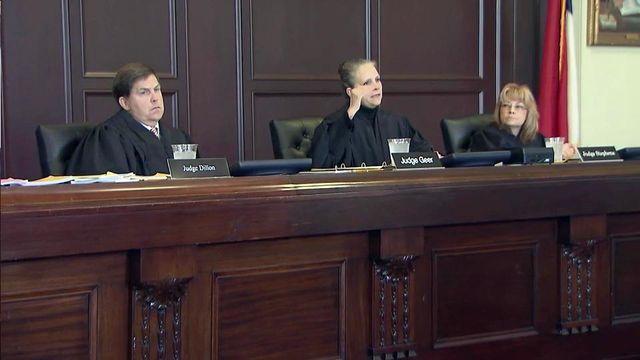Skeptical appeals court takes on NC law ending teacher tenure rights
A North Carolina Court of Appeals panel expressed serious doubts Thursday about the legality of a 2013 state law requiring veteran teachers to surrender their tenure rights in exchange for multi-year contracts.
Posted — UpdatedPreviously, teachers could earn tenure, officially called career status, after five years, which spelled out a specific list of reasons under which they could lose their jobs and gave them extra due process rights, including the right to a hearing if they were disciplined or fired.
In an effort to move North Carolina to a performance-based system for paying teachers instead of one based on longevity by 2018, lawmakers called on school districts to identify the top 25 percent of their teachers and offer them new four-year contracts with $500 annual salary increases. In exchange, those teachers would lose their career status protections.
The North Carolina Association of Educators sued to halt the law, arguing that the state couldn't arbitrarily take away the tenure rights teachers had worked to earn. A Superior Court judge agreed last year, ruling that the law violates the contract clause of the U.S. Constitution and amounts to an illegal taking of property under the state constitution.
The state and the NCAE both appealed the ruling. The state wants the 2013 law upheld, while the teachers group contends the ruling overturning it should extend to teachers who hadn't yet earned career status as of 2013 because the chance to earn career status was part of their terms of employment when they accepted their jobs.
Deputy Attorney General Melissa Tripp argued Thursday that the new law "merely changed the review periods to one, two and four years," noting that no teachers have lost their jobs because of the change.
"It's clear the state is legislating for the education of the children in North Carolina," Tripp said. "The state has a constitutional duty to be promulgating educational policy."
The skeptical judges peppered Tripp with questions about property rights, due process and legal precedents.
"With respect to someone in whom the career status is already, in a sense, vested ... it is taking away that contract for career status, isn't it?" Judge Martha Geer asked.
"Due process is still met even though they have no right to a hearing?" Judge Chris Dillon asked.
Tripp said state law also provides a number of reasons that career teachers can be dismissed, and the new law only modifies those conditions of continued employment in the teacher contracts. Local school boards, she said, still had the option of holding a hearing before a teacher is removed or demoted.
Geer remained unconvinced, however.
"We are basically making the teachers who are career-status now probationary teachers again," she said, "except that you have more than a one-year contract."
Narendra Ghosh, an attorney for the NCAE and several teachers, agreed, saying veteran teachers no longer have the right to know why they are losing their jobs.
"One of the benefits to teachers under the career status law is they knew where they stood," Ghosh said. "They could teach controversial subjects. They could advocate for their students in ways that maybe administrators wouldn't appreciate. They knew they could do those things because they weren't crossing the lines of the statute.
"Now, they don't know where they stand," he said.
NCAE President Rodney Ellis said about 56,000 of the 95,000 public school teachers in North Carolina have tenure.
"I think It’s a question of the state honoring the commitment that it made to educators and teachers," Ellis said after the court hearing. "Once you begin to eliminate those due process rights, then you’re putting them at a disadvantage, and you’re impacting whether they even remain in the profession."
School districts never had problems removing ineffective teachers before, Ghosh said, so eliminating tenure rights benefits no one. In fact, he said, it has resulted in some longtime teachers leaving the state or the profession altogether.
Judge Linda Stephens questioned the wisdom of removing a key benefit for North Carolina teachers when the state is trying to upgrade education.
"How in the world are we going to attract better teachers when, not only have they historically received extremely low salaries for being teachers in North Carolina, they've gotten no raises and now they've got no career status option?" Stephens said.
• Credits
Copyright 2024 by Capitol Broadcasting Company. All rights reserved. This material may not be published, broadcast, rewritten or redistributed.






